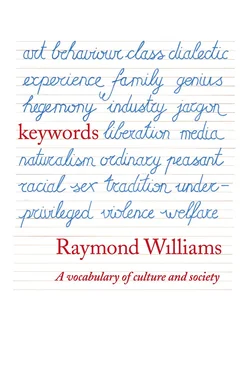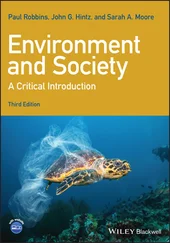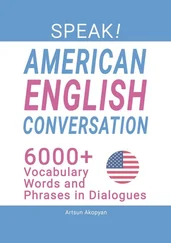Raymond Williams - Keywords - A Vocabulary of Culture and Society
Здесь есть возможность читать онлайн «Raymond Williams - Keywords - A Vocabulary of Culture and Society» — ознакомительный отрывок электронной книги совершенно бесплатно, а после прочтения отрывка купить полную версию. В некоторых случаях можно слушать аудио, скачать через торрент в формате fb2 и присутствует краткое содержание. Жанр: unrecognised, на английском языке. Описание произведения, (предисловие) а так же отзывы посетителей доступны на портале библиотеки ЛибКат.
- Название:Keywords: A Vocabulary of Culture and Society
- Автор:
- Жанр:
- Год:неизвестен
- ISBN:нет данных
- Рейтинг книги:3 / 5. Голосов: 1
-
Избранное:Добавить в избранное
- Отзывы:
-
Ваша оценка:
- 60
- 1
- 2
- 3
- 4
- 5
Keywords: A Vocabulary of Culture and Society: краткое содержание, описание и аннотация
Предлагаем к чтению аннотацию, описание, краткое содержание или предисловие (зависит от того, что написал сам автор книги «Keywords: A Vocabulary of Culture and Society»). Если вы не нашли необходимую информацию о книге — напишите в комментариях, мы постараемся отыскать её.
Keywords: A Vocabulary of Culture and Society — читать онлайн ознакомительный отрывок
Ниже представлен текст книги, разбитый по страницам. Система сохранения места последней прочитанной страницы, позволяет с удобством читать онлайн бесплатно книгу «Keywords: A Vocabulary of Culture and Society», без необходимости каждый раз заново искать на чём Вы остановились. Поставьте закладку, и сможете в любой момент перейти на страницу, на которой закончили чтение.
Интервал:
Закладка:
Of course the issues could not all be understood simply by analysis of the words. On the contrary, most of the social and intellectual issues, including both gradual developments and the most explicit controversies and conflicts, persisted within and beyond the linguistic analysis. Yet many of these issues, I found, could not really be thought through, and some of them, I believe, cannot even be focused on unless we are conscious of the words as elements of the problems. This point of view is now much more widely accepted. When I raised my first questions about the differing uses of culture I was given the impression, in kindly and not so kind ways, that these arose mainly from the fact of an incomplete education, and the fact that this was true (in real terms it is true of everyone) only clouded the real point at issue. The surpassing confidence of any particular use of a word, within a group or within a period, is very difficult to question. I recall an eighteenth-century letter:
What, in your opinion, is the meaning of the word sentimental , so much in vogue among the polite …? Everything clever and agreeable is comprehended in that word … I am frequently astonished to hear such a one is a sentimental man; we were a sentimental party; I have been taking a sentimental walk.
Well, that vogue passed. The meaning of sentimental changed and deteriorated. Nobody now asking the meaning of the word would be met by that familiar, slightly frozen, polite stare. When a particular history is completed, we can all be clear and relaxed about it. But literature , aesthetic , representative , empirical , unconscious , liberal : these and many other words which seem to me to raise problems will, in the right circles, seem mere transparencies, their correct use a matter only of education. Or class , democracy , equality , evolution , materialism : these we know we must argue about, but we can assign particular uses to sects, and call all sects but our own sectarian . Language depends, it can be said, on this kind of confidence, but in any major language, and especially in periods of change, a necessary confidence and concern for clarity can quickly become brittle, if the questions involved are not faced.
The questions are not only about meaning; in most cases, inevitably, they are about meanings. Some people, when they see a word, think the first thing to do is to define it. Dictionaries are produced and, with a show of authority no less confident because it is usually so limited in place and time, what is called a proper meaning is attached. I once began collecting, from correspondence in newspapers, and from other public arguments, variations on the phrases ‘I see from my Webster’ and ‘I find from my Oxford Dictionary’. Usually what was at issue was a difficult term in an argument. But the effective tone of these phrases, with their interesting overtone of possession (‘my Webster’), was to appropriate a meaning which fitted the argument and to exclude those meanings which were inconvenient to it but which some benighted person had been so foolish as to use. Of course if we want to be clear about banxring or baobab or barilla , or for that matter about barbel or basilica or batik , or, more obviously, about barber or barley or barn , this kind of definition is effective. But for words of a different kind, and especially for those which involve ideas and values, it is not only an impossible but an irrelevant procedure. The dictionaries most of us use, the defining dictionaries, will in these cases, and in proportion to their merit as dictionaries, list a range of meanings, all of them current, and it will be the range that matters. Then when we go beyond these to the historical dictionaries, and to essays in historical and contemporary semantics, we are quite beyond the range of the ‘proper meaning’. We find a history and complexity of meanings; conscious changes, or consciously different uses; innovation, obsolescence, specialization, extension, overlap, transfer; or changes which are masked by a nominal continuity so that words which seem to have been there for centuries, with continuous general meanings, have come in fact to express radically different or radically variable, yet sometimes hardly noticed, meanings and implications of meaning. Industry , family , nature may jump at us from such sources; class , rational , subjective may after years of reading remain doubtful. It is in all these cases, in a given area of interest which began in the way I have described, that the problems of meaning have preoccupied me and have led to the sharpest realization of the difficulties of any kind of definition.
The work which this book records has been done in an area where several disciplines converge but in general do not meet. It has been based on several areas of specialist knowledge but its purpose is to bring these, in the examples selected, into general availability. This needs no apology but it does need explanation of some of the complexities that are involved in any such attempt. These can be grouped under two broad headings: problems of information and problems of theory.
The problems of information are severe. Yet anyone working on the structures and developments of meaning in English words has the extraordinary advantage of the great Oxford Dictionary . This is not only a monument to the scholarship of its editors, Murray, Bradley and their successors, but also the record of an extraordinary collaborative enterprise, from the original work of the Philological Society to the hundreds of later correspondents. Few inquiries into particular words end with the great Dictionary ’s account, but even fewer could start with any confidence if it were not there. I feel with William Empson, who in The Structure of Complex Words found many faults in the Dictionary , that ‘such work on individual words as I have been able to do has been almost entirely dependent on using the majestic object as it stands’. But what I have found in my own work about the OED, when this necessary acknowledgment has been made, can be summed up in three ways. I have been very aware of the period in which the Dictionary was made: in effect from the 1880s to the 1920s (the first example of the current series of Supplements shows addition rather than revision). This has two disadvantages: that in some important words the evidence for developed twentieth-century usage is not really available; and that in a number of cases, especially in certain sensitive social and political terms, the presuppositions of orthodox opinion in that period either show through or are not far below the surface. Anyone who reads Dr Johnson’s great Dictionary soon becomes aware of his active and partisan mind as well as his remarkable learning. I am aware in my own notes and essays that, though I try to show the range, many of my own positions and preferences come through. I believe that this is inevitable, and all I am saying is that the air of massive impersonality which the Oxford Dictionary communicates is not so impersonal, so purely scholarly, or so free of active social and political values as might be supposed from its occasional use. Indeed, to work closely in it is at times to get a fascinating insight into what can be called the ideology of its editors, and I think this has simply to be accepted and allowed for, without the kind of evasion which one popular notion of scholarship prepares the way for. Secondly, for all its deep interest in meanings, the Dictionary is primarily philological and etymological; one of the effects of this is that it is much better on range and variation than on connection and interaction. In many cases, working primarily on meanings and their contexts, I have found the historical evidence invaluable but have drawn different and at times even opposite conclusions from it. Thirdly, in certain areas I have been reminded very sharply of the change of perspective which has recently occurred in studies of language: for obvious reasons (if only from the basic orthodox training in dead languages) the written language used to be taken as the real source of authority, with the spoken language as in effect derived from it; whereas now it is much more clearly realized that the real situation is usually the other way round. The effects are complex. In a number of primarily intellectual terms the written language is much nearer the true source. If we want to trace psychology the written record is probably adequate, until the late nineteenth century. But if, on the other hand, we want to trace job , we have soon to recognize that the real developments of meaning, at each stage, must have occurred in everyday speech well before they entered the written record. This is a limitation which has to be recognized, not only in the Dictionary , but in any historical account. A certain foreshortening or bias in some areas is, in effect, inevitable. Period indications for origin and change have always to be read with this qualification and reservation. I can give one example from personal experience. Checking the latest Supplement for the generalizing contemporary use of communications , I found an example and a date which happened to be from one of my own articles. Now not only could written examples have been found from an earlier date, but I know that this sense was being used in conversation and discussion, and in American English, very much earlier. I do not make the point to carp. On the contrary, this fact about the Dictionary is a fact about any work of this kind, and needs especially to be remembered when reading my own accounts.
Читать дальшеИнтервал:
Закладка:
Похожие книги на «Keywords: A Vocabulary of Culture and Society»
Представляем Вашему вниманию похожие книги на «Keywords: A Vocabulary of Culture and Society» списком для выбора. Мы отобрали схожую по названию и смыслу литературу в надежде предоставить читателям больше вариантов отыскать новые, интересные, ещё непрочитанные произведения.
Обсуждение, отзывы о книге «Keywords: A Vocabulary of Culture and Society» и просто собственные мнения читателей. Оставьте ваши комментарии, напишите, что Вы думаете о произведении, его смысле или главных героях. Укажите что конкретно понравилось, а что нет, и почему Вы так считаете.












